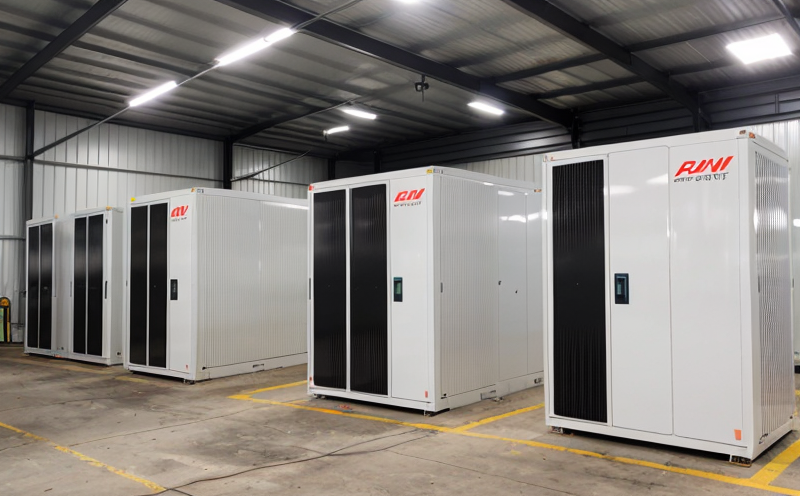UL 2271 Battery Testing for Light Electric Vehicles
The UL 2271 standard is a critical benchmark for ensuring the safety and reliability of batteries used in light electric vehicles (LEVs). This testing service ensures compliance with stringent international standards, providing peace of mind to manufacturers and regulatory bodies. LEVs are increasingly popular as they offer an eco-friendly alternative to traditional gasoline-powered vehicles. However, their widespread adoption hinges on robust battery performance and safety.
Battery failure in LEVs can lead to catastrophic consequences, including fires and explosions. UL 2271 addresses these risks by subjecting batteries to a series of rigorous tests designed to mimic real-world conditions. The test protocol encompasses multiple phases aimed at evaluating various aspects such as mechanical integrity, thermal stability, electrical performance, and durability.
UL 2271 testing is not just about ensuring compliance with regulatory requirements; it also plays a pivotal role in advancing the technology. By subjecting batteries to these tests, manufacturers can identify potential weaknesses early on, allowing for continuous improvements. This proactive approach helps maintain high standards of quality and safety, which are essential for the long-term success of LEVs.
Compliance with UL 2271 is a testament to a company's commitment to excellence in battery technology. It demonstrates that the manufacturer adheres to the highest safety and performance benchmarks set by leading institutions worldwide. This compliance also opens doors to international markets, where stringent safety regulations are enforced.
The testing process involves several key steps. Initially, batteries undergo mechanical stress tests to assess their ability to withstand impacts and vibrations. Thermal cycling tests simulate extreme temperature changes, ensuring the battery remains stable under varying environmental conditions. Electrical performance tests evaluate charging efficiency, discharge rates, and overall power output. Lastly, durability tests assess the longevity of the battery over extended periods.
These comprehensive tests are conducted using state-of-the-art equipment that closely mimics real-world scenarios. The instrumentation used in these tests includes high-precision temperature control systems, advanced voltage measurement devices, and sophisticated data logging software. The results are meticulously recorded and analyzed to ensure the battery meets all specified criteria.
UL 2271 testing is a rigorous yet essential process that helps manufacturers produce safe, reliable, and efficient batteries for LEVs. By adhering to this standard, companies not only meet regulatory requirements but also enhance their reputation in the market. This service ensures that consumers can trust the safety of the products they use.
Applied Standards
The UL 2271 Battery Testing for Light Electric Vehicles is based on the UL 2271 standard. This standard provides a framework for testing batteries used in LEVs, ensuring they meet rigorous safety and performance criteria. The UL 2271 standard is widely recognized and adopted by manufacturers and regulatory bodies around the world.
- Thermal Stability: Ensures that the battery remains stable under extreme temperature conditions.
- Mechanical Integrity: Evaluates the battery’s ability to withstand mechanical stress without compromising safety or performance.
- Electrical Performance: Measures the efficiency and reliability of the battery during charging and discharging cycles.
- Durability: Assesses the long-term performance and longevity of the battery under normal operating conditions.
Benefits
UL 2271 testing offers numerous benefits to manufacturers, regulatory bodies, and consumers alike. For manufacturers, it provides a comprehensive evaluation of their batteries, identifying potential weaknesses early on in the development process. This proactive approach ensures that only safe and reliable products reach the market.
Regulatory bodies can rely on UL 2271 testing to enforce safety standards, ensuring that all LEVs meet stringent requirements. This standardization helps maintain a high level of safety across the industry. Consumers benefit from this service by gaining confidence in the safety and reliability of the products they purchase.
Compliance with UL 2271 also provides significant market advantages. It opens doors to international markets, where stringent safety regulations are enforced. This compliance enhances a company’s reputation, making it more attractive to investors and partners. Furthermore, it helps manufacturers stay ahead of the competition by ensuring they meet the highest industry standards.
By adhering to this standard, companies can demonstrate their commitment to excellence in battery technology. This dedication not only meets regulatory requirements but also enhances trust among consumers and stakeholders. In an era where safety and sustainability are paramount, UL 2271 testing is a critical tool for ensuring the future success of LEVs.
Competitive Advantage and Market Impact
- Enhanced Safety: Compliance with UL 2271 ensures that batteries used in LEVs meet rigorous safety standards, reducing the risk of fires and other hazards.
- Improved Performance: Testing under real-world conditions helps identify potential weaknesses early on, allowing for continuous improvements in battery performance.
- Increased Reputation: Adhering to this standard enhances a company’s reputation, making it more attractive to investors and partners.
- Better Consumer Trust: Consumers are more likely to trust products that meet stringent safety and performance criteria, fostering long-term customer loyalty.
- Market Access: Compliance with UL 2271 opens doors to international markets where stringent regulations are in place.
The competitive advantage gained from UL 2271 testing is significant. It not only ensures compliance with regulatory requirements but also sets a benchmark for excellence in battery technology. This standardization helps maintain high safety and performance standards across the industry, fostering trust among consumers and stakeholders. In an increasingly regulated environment, UL 2271 testing provides a competitive edge that can propel companies to the forefront of innovation.





